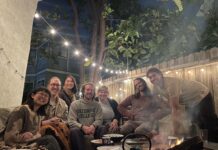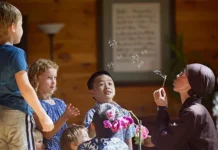By Edward Pinkney
‘Mindfulness’ has become a bit of a buzz word in connection with mental health & wellbeing recently. With this in mind I booked myself in to Plum Village, a Buddhist monastery in the south of France, to experience it first hand. Plum Village was founded by Thich Nhat Hanh – a renowned Vietnamese monk, author and anti-war protester, who was nominated for the Nobel Peace Prize by Martin Luther King in the 1960’s.
The Village is actually a collection of smaller hamlets in a patch of beautiful vineyard-laden countryside near Bordeaux. Each hamlet can be found with brown-robed monks and nuns slowly walking along paths that weave around a handful of huts and winter-defying greenery. Day-to-day life is centred around simple living and the constant practice of mindfulness. Western pioneer Jon Kabat-Zinn defines mindfulness as “paying attention on purpose in the present moment, non-judgmentally, as if your life depended on it.” We might just think of it as being in the ‘here and now’ though.
After being picked up at the local train station by a smily Vietnamese nun, fellow new arrivals and I immediately slotted into the daily routine of the Village. This meant, even whilst registering and unpacking, we were obliged to freeze and take a deep breath every half hour or so when the ‘mindfulness bell’ rang out around the Village.
At first this seemed a bit ridiculous, and I found myself suppressing laughter when it rang at some of the more awkward moments for myself and others. But it acts as a constant reminder of where we are, and showed me how often I get distracted and caught up in things. In Plum Village every single activity becomes an opportunity to be mindful.
Most mornings monks and guests met for some singing and ‘mindful walking’ around the grounds. A long line of us would walk very slowly around the grounds, being very aware of each step. We were encouraged, if we wished, to picture a loved one who wasn’t able to be there and ‘walk with’ them. I walked with my mum.
There were around 50 guests (or lay-people) in my hamlet – some here for a few months, others like me for a week or two. The village draws a complete mixture of ages, nationalities and personalities, but all are united by the shared practice, and by the deeper connection that the monks inspire. The effects of this are immediately apparent.
There is a calmness and warmth. Smiles are sincere, and eye contact lingers. Time seems slower, which means thoughts, speech and action become smoother and more purposeful. There is no stress. No tension. Minds are not given the opportunity to dwell on anxieties, to judge others, or to take things for granted. Instead they are clear and concentrated, which brings heightened creativity and appreciation. And despite the emphasis on not-striving, paradoxically, more tends to be achieved.
The 50 or so monks living there are exceptionally happy, humble and welcoming; many were Westerners, including several former mental health professionals. Thich Nhat Hanh (who is reminiscent of Yoda from Star Wars..!) is their teacher, and twice a week he gives a talk for the whole Village. Seeing him at lunch soon after my arrival, I immediately felt inclined to write to him to try and meet the real man behind the public image.
After hearing one of his talks though, something in me changed. I could see that there was no public/private split with him, and what we had witnessed through his talks,as well as videos and books, was the whole of the man. Like a radiator giving off warmth, his integrity seems to be such that nothing is reserved for a private audience. Thich Nhat Hanh is a man who sees no divisions, and attaches no labels.
All are welcome at Plum Village, and all will feel welcomed if they show humility and a willingness to look deeply at themselves and others. He has succeeded in creating a global network of followers and groups. And despite the term Buddhism being used, the only faith I felt impressed upon me, was faith that there is goodness inside everyone, and this goodness, if cultivated, can overpower the wrongdoing and suffering in the world.
Whilst travelling back to the UK I felt both sad and excited. Sad to be leaving somewhere that, even after just a few days, felt like home. Excited about the potential of mindfulness in promoting wellbeing; and how the future might look if communities like Plum Village continue to flourish. As my train arrives in Paris, I smile at the stream of people departing from the adjoining carriage, and wait for a gap to appear so that I can step off the train.
Abruptly, the man behind me pushes us both through, saying, “this is France. Nobody helps people here.” I laugh at the irony of this coming after the last few days. He scurries off, then turns back to me for a moment and elbows the air with a grin, as if to say, ‘force is the only way to get things done in this world, don’t forget it’. He was wrong.
















